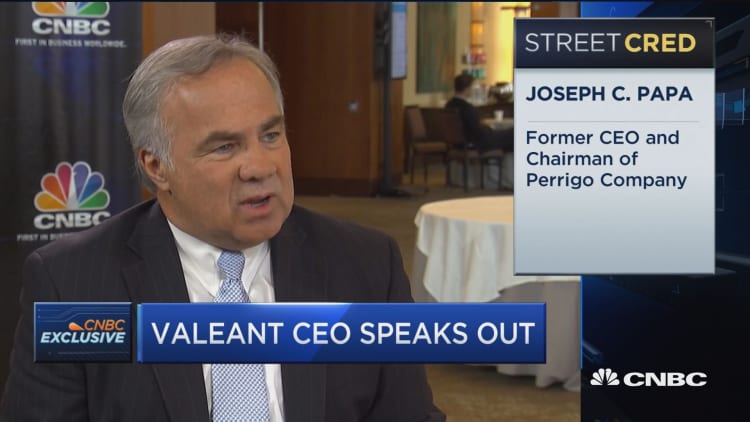
Aside from the financial crisis, health care hasn't seriously lagged the broader market as badly as it is now since Bill Clinton was president.
Health care has been slammed by political headwinds, largely the result of Democrat Hillary Clinton's assault on drug pricing during the presidential campaign. But both major party candidates could rock the sector from the White House, as Republican Donald Trump has also criticized pricing for Medicare drugs and has said he would dismantle the Affordable Care Act.
"It's at a valuation discount that exceeds the discount we saw in 1993, 1994 when then President Bill Clinton tried to reform the health care industry unsuccessfully. The effort was spearheaded by then first lady Hillary Clinton," said Julian Emanuel, UBS equity and derivatives strategist.
"Basically what we've seen is a year of position de-risking in a sector that was, given its earnings profile over two of the most choppy years of earnings growth … a very, very consensus trade coming into the end of 2015. Then all of a sudden the political invective started, from all sides," said Emanuel.
The health care sector has been particularly vulnerable to comments from Hillary Clinton, who sent biotech careening in September of 2015. That was when she tweeted about price gouging after revelations about gigantic price hikes by Martin Shkreli's Turing Pharmaceuticals. That sent the popular IBB ishares Nasdaq Biotech ETF down by about 20 percent in just a few weeks last fall, and the IBB bottomed with a near 33 percent decline by February.
Clinton dealt another blow to the sector after she criticized Mylan in late August for its price tag for the life-saving EpiPen allergy treatment. Mylan responded a day later by offering discounts. In the past month, the S&P health care sector has fallen 3 percent, while the S&P 500 is basically flat.
The political assault has weakened the sector to where it is the worst performing sector, up just 1 percent year-to-date, while tech, materials, utilities, energy and telecommunications are all up double digits.
"What that did was drive valuations in the health care sector down to a discount relative to the S&P 500, where it's only been twice in 25 years," said Emanuel. He said the last time the discount was even greater, when the market was recovering from the great recession. "Roughly in 2009, investors' first reaction upon the recovery was to buy the highest beta stocks" — or stocks that are the most volatile — "which health care has never been viewed as," he said.
While he and a number of market strategists like health care stocks, Emanuel said he believes Wall Street's call on earnings is wrong — with overall earnings growth of 14 percent projected for the S&P 500 in 2017.
"Health care has consistently outgrown the S&P 500 over the last four years. Every year, high single to low double-digits earnings growth. If you look at 2017, this is the first year where the consensus believes the broader index is going to grow at a faster pace than health care. We think the consensus is wrong that broader earnings are going to grow 14 percent, but it is reasonable for health care earnings to grow by 8 to 10 percent in 2017," he said.
Emanuel said he expects earnings for the broader S&P 500 to grow by 5.9 percent in 2017. "When you look at the bar, it's set reasonably for health care," he said. He reiterated his overweight on the group this week.
In the second-quarter earnings season, the S&P health care sector had the second highest percentage of earnings growth of the major S&P sectors, with growth of 7.5 percent, according to Thomson Reuters. It also had the highest proportion of companies beating earnings estimates.
Much of Wall Street has been bullish on the sector. In a quick survey this summer of eight major investment analysts' calls on S&P 500 sectors, CNBC found six of those firms were overweight health care.
"Some price regulation is priced in. We all know how difficult passing some type of regulatory reform is going to be in such a bitter and partisan environment in Washington. When we look at it, (the market) is not pricing in, for whatever reason, the potential upside which is derived if you could have politicians that steer you toward tax reform next year," he said.
Trump and some Republicans would like to grant a tax holiday so that companies could repatriate the cash they are hoarding overseas, as well as reduce the corporate tax rate. Emanuel said tax rules could be subject to negotiations, no matter who is in the White House.
"Health care has $167 billion worth of offshore cash, second only to technology. If that cash is coming home, we could see it finding its way in the normal means we've seen in terms of return to shareholders over the last several years, either by buybacks or increased dividends," said Emanuel. He also said the industry could use the cash to continue its merger spree.
Credit Suisse added Zoetis to its focus list this week. Eli Lilly has been on the list. McKesson, Amgen, Aetna, Zimmer and Biogen are among the health care names Morgan Stanley is over-weighting.
UBS has buy ratings on AbbVie, Edwards Lifesciences Corp, Gilead, HCA Holdings, Johnson and Johnson, Merck, Pfizer and United Health.
Emanuel said the current discount of 1.5 multiple points for the health care sector relative to the overall S&P 500 compares to a lower, approximate average of 1.1 points during the Clinton era.


